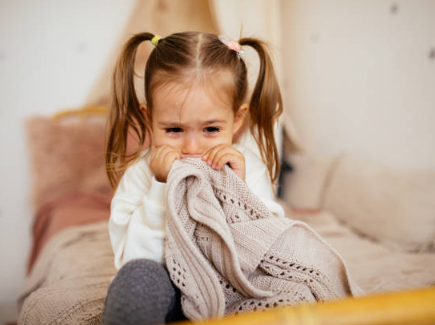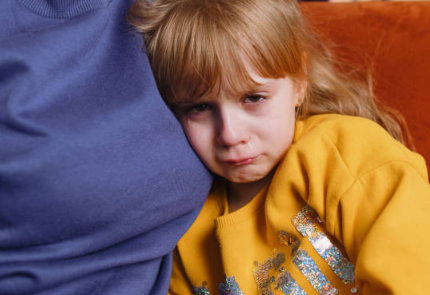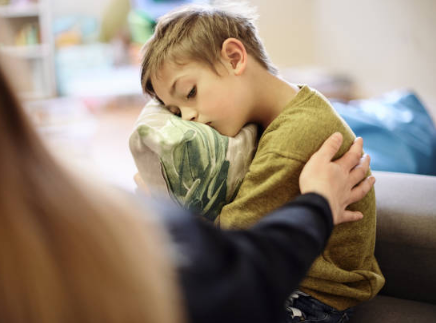If saying goodbye to your child is filled with screams and tears, your child may be experiencing separation anxiety. “When children start walking, they assert their independence and stay away from their parents. But they’re not ready for a complete separation,” says Fran Walfish, a psychiatrist, Ph.D., psychotherapist and author of The Self-Aware Parent.
Toddlers may act as if they can do everything on their own, but once you’re gone, they’ll want to come back to you because they crave the sense of familiarity and security you provide. But knowing that this behavior is normal doesn’t make things easy – for both of you.

Read on to learn more about separation anxiety in young children, as well as tips to ease your child’s (or your own) concerns.
What Is Separation Anxiety?
Put simply, separation anxiety is when a child feels anxious or scared when they are separated from their caregivers. Separation anxiety in toddlers and infants is part of normal development and usually begins at 8 or 9 months of age. It can last up to 3 years of age. But separation anxiety can also affect older children and adults.
Why is this happening? Whether you’re sending your kids to daycare or leaving them home with grandma, saying goodbye can be tough. When they are able to walk, children often understand the persistence of an object – that it continues to exist even if something (or someone) is invisible or audible.
But young children are not yet able to understand the concept of time. Leaving them in the bedroom for a few minutes or letting a babysitter take care of them for a few hours will all feel the same to them. This can be scary because young children think their survival depends on the presence of a primary caregiver nearby.
It’s strange that the fact that they care so much is a good thing. “It’s a bit ironic that anxiety can be a sign of increased autonomy in children,” said Dr. Miranda Goodman-Wilson, content editor at the American Institute of Behavioral and Social Science Research. “They have their own views on the situation – parents shouldn’t leave – and want to exert control.”
What Triggers Separation Anxiety in Young Children?
The following conditions may trigger your child’s separation anxiety.
Say Goodbye
Dr. Wolfish noted that young children are struggling to gain control of their bodies (such as running and feeding themselves), and that every new challenge they face comes with stress. As a result, they may feel conflicted about the safety of being away from their primary caregiver. Toddlers need to be assured that when you leave, you will always come back.
Large Gatherings
Attending large parties can make your child especially anxious, and he may be afraid of losing you in the crowd.
Go to Sleep
Leaving your child in the room or napping at night can cause anxiety, as nap time and nighttime can be the longest time they spend alone on a regular basis.

Signs of Separation Anxiety
Dr. Erin Boyd-Soisson, a professor of human development and family science at Messiah University in Meca Nichsburg, Pennsylvania, said separation anxiety “is typically most prevalent over the 8- to 18-month period.”
When the caregiver leaves, the child can do the following:
- Close
- Lose one’s temper
- Resist other caregivers trying to convince parents not to leave
- Signs of fear and upset are shown when parents enter another room, drop them off at daycare, or leave them alone while sleeping
The outbreak usually subsides once the caregiver is out of sight. “This anxiety helps keep children in close contact with their caregivers, who are the source of their love and security,” says Dr Boyd Soisson. ”
Do Young Children Grow up to Get Rid of Separation Anxiety?
As children get older, separation anxiety tends to decrease, but similar feelings may occur for a short period of time due to other reasons. “When older toddlers or preschoolers are sick or stressed, separation anxiety can come back together,” says Dr. Boyd Soisson.
“For example, most 2-year-olds who have been in daycare centers for a while are usually doing well when their parents leave. However, it is not uncommon for them to experience when they start to get sick or are under stress. Hold on tightly to your parents as you get out of the car,” she added.
This behavior is a normal part of a child’s development and will lessen and disappear over time. However, every child is unique, so there is no set time for the beginning or end of separation anxiety. Sometimes, it can take months for a toddler’s anxiety to dissipate, so be prepared to return, especially if your daily routine changes due to holidays, illness, or moving.
How Can I Help My Child Overcome Separation Anxiety?
Separation anxiety in young children can last for months or years, but there are many things you can do to relieve symptoms. Follow these tips to help address your child’s concerns.
Say Goodbye Briefly
Whenever you leave your child, warn them in advance that the babysitter is coming or that you will drop them off, and then say goodbye quickly. Dr. Vincent Barron, a child psychologist at Children’s Charities Hospital in Kansas City, Missouri, said, “If you’re acting anxious, or keep coming back for hugs, they’ll think there’s something to worry about. ”
Although you may be tempted, avoid sneaking out when your child is distracted, which may make them worry that you may disappear without warning, causing your child to be more clingy. Try to convey the message that the time of separation is temporary, and there is no need to cause panic.
Work out the Ritual of Leaving
It can help to develop a very short routine for the process. You might say,”I’ll come back and pick you up after work.” I love you. Then hug your child and leave. By saying goodbye in the same way every time, you can create a familiar transition from being with you to not being with you.
Prepare for an Event
Have your babysitter, daycare teacher, or other caregiver have an activity ready as soon as you hand over your child to you. Elizabeth Pantley, author of The No-Cry Separation Anxiety Solution, says that engaging children in clapping games or new toys can make them forget the fact that you’re leaving.
Don’t Ignore Their Anxieties
Donna Holloran, owner of Babygroup, Inc. in Santa Monica, Calif., says it’s important to acknowledge your child’s separation anxiety. You can say,”I know you’re going to have a really good time with grandma, but it’s okay if you want me.” You can tell grandma you miss me, and I bet grandma will give you a big hug.”

Pay Attention to Your Children at Large Gatherings
When you arrive at a place with many faces, avoid forcing your child to interact without you. Instead, wait until they become interested in someone else, but don’t walk away or disappear. “They might accept someone to hold them, but after a few minutes they will feel like it’s too much,” Pantley said.
If your child is upset, be prepared to pick them up; Pushing them beyond their limits will only make the next group’s situation more difficult. Don’t feel pressured if you have to stay with your child all the time. “You’re not weakening them, you’re offering support that will help them feel comfortable in their future social environment,” Dr. Wolfish said.
Establish a Soothing Bedtime
Establish a relaxing evening ritual, such as listening to a favorite storybook or song after taking a bath. This will help your child adjust to the fact that bedtime (and alone time) is coming. Give them a love and let them hold and turn on some soothing sounds, such as soft white noise or wave recordings. When you leave, it makes the silence in their room less noticeable, Pantley said.
Give Them Independence After a Nap
If your child wakes up from a nap and plays happily in the crib, don’t rush to hold them. “Give your child a chance to experience what it’s like to be alone and have a good time,” Pantley advises. Finding them comfortable with this will boost their self-confidence and independence, and ultimately help them feel more secure about themselves.
Bring a Meaningful Item for Your Child
When children leave their parents, give them something to take with them; It can be something they have chosen for themselves that reminds them of their hometown and family (special photos in frames, stuffed animals, etc.). It is important that the child can use the item when needed and that it is not under the control of the responsible adult. This way, the child can use it as a soothing tool when they feel separation anxiety.
Watch Developmentally Appropriate TV Shows
Another idea is to watch a developmentally appropriate TV show that deals with separation anxiety (an example is the episode “The Adults Are Back” in Daniel Tiger’s Neighborhood). This is because children are often visual Xi (like most people) who may relate to simple stories and songs, helping them feel less lonely.
Read a Picture Book About It
Children’s literature helps with social-emotional Xi and also provides relevant contexts for children. Consider reading Audrey Payne’s The Kissing Hand, in which a baby raccoon who is afraid to leave her mother realizes that she has an endless love whether they are together or apart.
When to Worry About Separation Anxiety
Although it can be difficult to hear a child cry, remember that separation anxiety does have a positive side: it shows that a healthy attachment has developed between the caregiver and the child. Julia J. Brown, associate professor of psychology at Albright College in Reading, Pennsylvania, Dr. F. Hebler says that while separation anxiety in young children is nothing to worry about, it’s important to watch out for signs of extreme anxiety.
In a few cases, separation anxiety occurs in children older than toddler age. Dr. Heberle recommends analyzing your child’s feelings surrounding the situation. Is there a parental conflict, divorce, or problematic childcare environment? If so, separation anxiety may be exacerbated. A family history of anxiety may also play a role, as research shows that anxiety disorders can run in families. If your child is showing excessive symptoms, such as vomiting, nightmares, or persistent worry, contact their healthcare provider.

